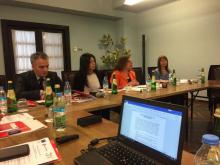Disaster Resilience Platform established in Georgia
Georgia is highly exposed to a wide range of natural hazards, including droughts, earthquakes, floods, landslides. Disaster risk management (DRM) is a national priority for the government. The country has focused on developing legislative and institutional frameworks for the DRM. The DRM system is governed by the Civil Safety Law, which was established in 2018 and defines emergency response at the national, regional, and local levels.
As part of the disaster risk reduction efforts, a Disaster Resilience Platform with the participation of government officials, international organizations, agencies, as well as non-governmental organizations was established at the initiative of Save the Children. Said Platform will have a purpose of coordinating relevant state agencies, NGOs and international organizations in the process of planning and implementing policies aimed at building disaster resilience of the country. Inclusion of the business sector in the Platform’s meetings for the purpose of ensuring its awareness raising on creating sustainable and disaster resilient environment is also planned. Participation of media representatives in the Platform’s activities is also envisaged.
The first meeting of the Disaster Resilience Platform was held on September 24, 2018 in Tbilisi, Georgia. During the introductory meeting, participants were informed about the state’s new disaster resilience strategic approach as well as the Terms of Reference of the Platform that was drafted by Save the Children and endorsed by the state. The Platform is established within the framework of “Institutionalization, replication and dissemination of ECHO DRR interventions in South Caucasus” project aiming to institutionalize, replicate and disseminate the best practices and models attained by all DIPECHO implementing partners during the four previous phases of the programme. The project is implemented with the financial support of the European Commission’s Civil Protection and Humanitarian Aid Department (ECHO) and is implemented in Georgia and Armenia by Save the Children.
Namely, starting from 2012, Save the Children has been actively engaged in awareness raising of children (including children with disabilities and special education needs), teachers and kindergarten personnel on disaster risk reduction mechanisms. Save the Children developed Inclusive Disaster Risk Reduction (IDRR) training modules, guidebooks, DRR dictionary on Georgian sign language, trained teachers, developed Inclusive DRR cartoons and TV shows, and elaborated DRR standards for preschool institutions and its monitoring tool. Save the Children ensured capacity building of government structures and advocated for formalization of IDRR mechanisms for teachers’ training at basic educational levels. These efforts were based on principle of inclusiveness of all communities, including ethnic minorities, internally displaced people, girls, children with disabilities.
As a result of cooperation with the like-minded civil society organizations, government, and national center for teachers’ professional development, the state recognized the importance of inclusive approaches in the process of disaster risk reduction and included said principle in the relevant policies and practices. Disaster Resilience Platform is an essential prerequisite for further upgrading the work of state and non-state actors in the relevant field.

 Georgia
Georgia